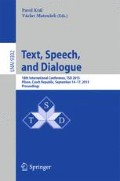Abstract
In this article we present a methodology for classification of text from web authors, using sociolinguistic inspired text features. The proposed methodology uses a baseline text mining based feature set, which is combined with text features that quantify results from theoretical and sociolinguistic studies. Two combination approaches were evaluated and the evaluation results indicated a significant improvement in both combination cases. For the best performing combination approach the accuracy was 84.36%, in terms of percentage of correctly classified web posts.
Access this chapter
Tax calculation will be finalised at checkout
Purchases are for personal use only
Preview
Unable to display preview. Download preview PDF.
References
Archakis, A., Kondyli, M.: Introduction to sociolinguistic issues. Nisos(in Greek), Athens (2004)
Cheng, N., Chandramouli, R., Subbalakshmi, K.P.: Author gender identification from text. The International Journal of Digital Forensics & Incident. Response 8(1), 78–88 (2011)
Soler, J., Wanner, L.: How to Use Less Features and Reach Better Performance in Author Gender Identification. Proceedings of LREC 2014 (2014)
Koppel, M., Argamon, S., Shimoni, A.R.: Automatically categorizing written texts by author gender. Literary and Linguistic Computing 17(4), 401–412 (2002)
Argamon, S., Koppel, M., Pennebaker, J.W., Schler, J.: Mining the Blogosphere: Age, gender and the varieties of self-expression. First Monday 12(9) (September 2007)DOI=Http://www.uic.edu/htbin/cgiwrap/bin/ojs/index.php/fm/article/view/2003
Ansari, Y.Z., Azad, S.A., Akhtar, H.: Gender Classification of Blog Authors. In: International Journal of Sustainable Development and Green Economic. Volume 2. (2013) ISSN no.:2315–4721
Burger, J.D., Henderson, J., Kim, G., Zarrella, G.: Discriminating gender on Twitter. In: Proceedings of the Conference on Empirical Methods in Natural Language Processing (EMNLP ’11), Stroudsburg, PA, USA, Association for Computational Linguistics (2011) 1301–1309
Kobayashi, D., Matsumura, N., Ishizuka, M.: Automatic Estimation of Bloggers’ Gender. In: Proceedings of International Conference on Weblogs and Social Media, Boulder: Omnipress (2007)
Zhang, C., Zhang, P.: Predicting gender from blog posts. Technical report, University of Massachusetts Amherst, USA (2010)
Mukherjee, A., Liu, B.: Improving gender classification of blog authors. In: Proceedings of the 2010 conference on Empirical Methods in natural Language Processing (EMNLP’10). (2010) 207–217 DOI=http:/www.aclweb.org/anthology/D10-1021
Peersman, C., Daelemans, W., Van Vaerenbergh, L.: Predicting Age and Gender in Online Social Networks. In: Proceedings of the \(3^{rd}\) International Workshop on Search and Mining User-Generated Contents (SMUC’11), Glasgow, UK (2011) 37–44
Sarawgi, R., Gajulapalli, K., Choi, Y.: Gender Attribution: Tracing Stylometric Evidence Beyond Topic and Genre. In: Proceedings of the Fifteenth Conference on Computational Natural Language Learning (Portland, USA, 9 - 24 June, 2011), Stroudsburg, PA, USA, Association for Computational Linguistics (2011) 78–86
Holmgren, J., Shyu, E.: Gender classification of facebook posts. (2013)
Rangel, F., Rosso, P.: Use of Language and Author Profiling: Identification of Gender and Age. In: Proceedings of the Tenth International Workshop on Natural Language Processing and Cognitive Science, Marseille, France (October 2013)
Marquardt, J., Farnadi, G., Vasudevan, G., Moens, M.F., Davalos, S., Teredesai, A., De Cock, M.: Age and Gender Identification in Social Media. Proceedings of CLEF 2014 Evaluation Labs (2014)
Gordon, E.: Sex, speech, and stereotypes: Why women use prestige speech forms more than men. Language in society 26(1), 47–63 (1997)
Cameron, D.: Gender, Language, and Discourse: A Review Essay. Signs: Journal of women, Culture and Society 23(4) (1998) 945–973
Cameron, D.: Language, Gender, and Sexuality: Current Issues and New Directions. Applied linguistics 26(4) (2005) 482–502 DOI=10.1093/applin/ami027
Bucholtz, M.: You da man: Narrating the racial other in the production of white masculinity. Journal of sociolinguistics 3(4), 443–460 (1999)
Bucholtz, M., Liang, A.C., Sutton, L.A.: Reinventing identities: The gendered self in discourse. Oxford University Press, New York (1999)
Fishman, P.M.: Interaction: The work women do. In: Language, Gender and Society, Rowley, Mass.: Newbury House (1983) 89–102
Lakoff, R.: Talking Power: The Politics of Language. Basic Books, New York (1990)
Lakoff, R.: Language and Women’s Place. Harper and Row, New York (1975)
Alami, M., Sabbah, M., Iranmanesh, M.: Male-Female Discourse Difference in Terms of Lexical Density. Research Journal Of Applied Sciences, Engineering and Technology. 5, 5365–5369 (2013)
Eckert, P.: Three waves of variation study: The emergence of meaning in the study of sociolinguistic variation. Annual review of Anthropology. 41, 87–100 (2012)
Moore, E., Podesva, R.: Style, indexicality, and the social meaning of tag questions. In: Language in Society. Volume 38, Cambridge Univ Press (2009) 447–485
Bucholtz, M.: From ’Sex Differences’ to Gender Variation in Sociolinguistics. In: University of Pennsylvania Working Papers in Linguistics (Papers from NWAV 30). Volume 8, University of Pennsylvania, Department of Linguistics (2002) 33–45
Bucholtz, M.: Theories of Discourse as Theories of Gender: Discourse Analysis in Language and Gender Studies. In: The Handbook of Language and Gender, Oxford Blackwell (2003) 43–68
Zheng, R., Li, J., Chen, H., Huang, Z.: A framework for authorship identification of online messages: Writing-style features and classification techniques. Journal of the American Society for Information Science and Technology 57(3), 378–393 (2006)
Esuli, A., Sebastiani, F.: Sentiwordnet: A publicly available lexical resource for opinion mining. Proceedings of Language Resources and Evaluation (LREC). 6, 417–422 (2006)
Witten, I.H., Frank, E.: Data Mining: Practical machine learning tools and techniques, 2nd edn. Elsevier, Morgan-Kaufman Series of Data Management Systems), San Francisco (2005)
Author information
Authors and Affiliations
Corresponding author
Editor information
Editors and Affiliations
Rights and permissions
Copyright information
© 2015 Springer International Publishing Switzerland
About this paper
Cite this paper
Simaki, V., Aravantinou, C., Mporas, I., Megalooikonomou, V. (2015). Using Sociolinguistic Inspired Features for Gender Classification of Web Authors. In: Král, P., Matoušek, V. (eds) Text, Speech, and Dialogue. TSD 2015. Lecture Notes in Computer Science(), vol 9302. Springer, Cham. https://doi.org/10.1007/978-3-319-24033-6_66
Download citation
DOI: https://doi.org/10.1007/978-3-319-24033-6_66
Published:
Publisher Name: Springer, Cham
Print ISBN: 978-3-319-24032-9
Online ISBN: 978-3-319-24033-6
eBook Packages: Computer ScienceComputer Science (R0)

